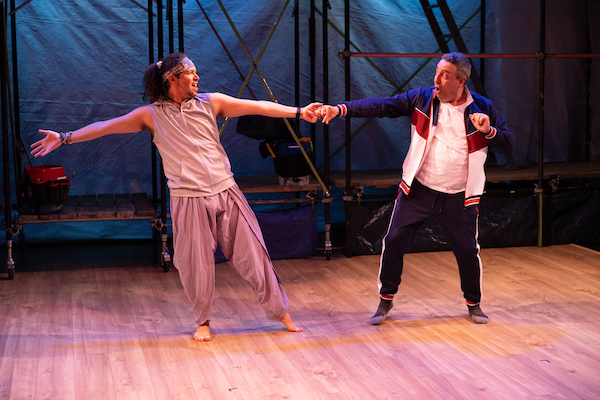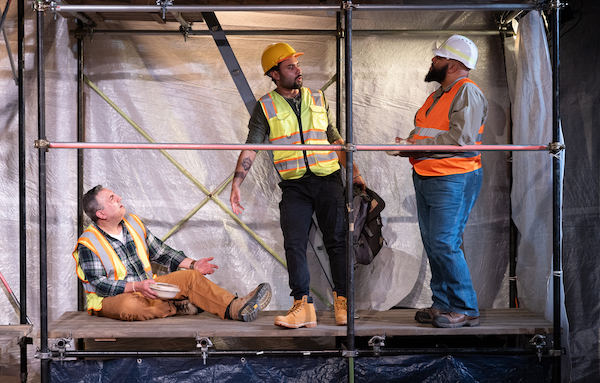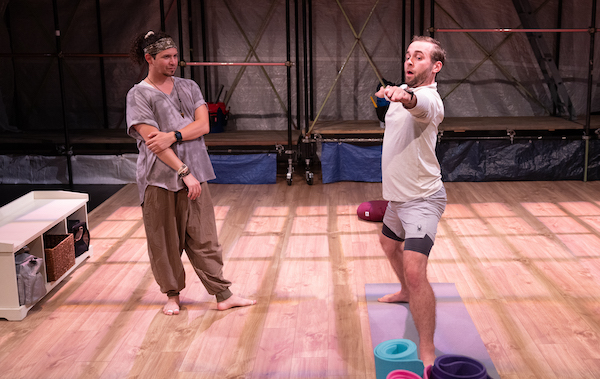Theater Review: “The Hombres” — Calming the Savage Beast
By David Greenham
There’s plenty of potential in Tony Meneses’s script about men sharing their inner lives with other men, but it is filled with too many silent types.
The Hombres by Tony Meneses. Directed by Armando Rivera. Produced by Gloucester Stage Company and Teatro Chelsea at Gloucester Stage, 267 E. Main St., Gloucester, through September 22, and then at Chelsea Theatre Works, 189 Winnisimmet St, Chelsea, September 27 through 29.

Ricardo Holguin and Luis Negrón in the GSC production of The Hombres. Photo: Jason Grow Photography
The practice of yoga encourages participants to focus on establishing an intention. It’s the key word that yoga instructor Julián (Ricardo “Ricky” Holguin) encourages his students (and the audience) to remember at the very end of Tony Meneses’s The Hombres.
Julián is the afternoon/evening instructor at a small, upscale New Jersey yoga studio. He’s also the one who must clean the wooden-floored space at the end of the day. The studio sits in the shadow of a large construction project for luxury apartments. The herd of workers at the construction site are represented here by Héctor (Arthur Gomez), a supervisor known for his heated temper; Pedro (Luis Negrón), the construction veteran; and Beto (Jaime José Hernández), a brash young guy who loves to spit on the Armani-clad businessmen who are walking the sidewalk below.
A potential conflict begins with a Post-it note from Julián’s unseen boss, a woman. She asks him to talk to the construction workers about their unruly behavior and noise. They’re too loud when they shout at each other on the job site; worse, one of them is staring into the studio during the day, and it is making the female clientele uncomfortable.
Julián is Latino, but not in the same way as the Spanish-speaking construction workers he’s asked to speak with. He’s a gay man who doesn’t speak Spanish, and he’s intimidated by the prospect of interacting with the workers. An aspiring dancer, he later explains that he “wasn’t white enough for the white companies, and I wasn’t Latino enough for the Latino companies.” He still wishes he could get a job dancing; he prefers to work on the modern dance piece he is creating. Julián is tired of deep cleaning the studio at the end of the day.
On cue, Héctor shows up in the studio and Julián clumsily shares the concerns of his boss. Héctor explains that he’s not looking at the women’s bodies. The truth is, he is studying their attitudes; when they enter the studio they are full of stress and they leave looking relaxed and happy.
As they chat Héctor, a former custodian, proposes a deal. He’ll clean the studio; in exchange, Julián will give him yoga lessons. “I can be your Mexican,” he quips.

Jaime José Hernández, Luis Negrón, and Arthur Gomez in the GSC production of The Hombres. Photo: Jason Grow Photography
A critical aspect of the mechanics of the plot of The Hombres is that both participants in the deal agree to keep the arrangement a secret. Julián hides the arrangement from his boss — he is afraid he will be fired. Héctor wants to avoid the inevitable ridicule that would come from his co-workers if they knew.
Yes, this is a clumsy set-up, but once the relationship between the construction site and the studio is established, the story begins to develop in interesting ways.
Héctor and Julián find common ground and share moments of emotional intimacy. A subplot or, perhaps more accurately, a side plot, involves white student Miles (Patrick O’Konis), a good-looking married professional whose wife is expecting their first child. There’s sexual tension between Miles and Julián that neither is willing to address.
Héctor’s co-workers begin to notice changes in his demeanor. “That man was tough as a brick,” Beto says, “Now he’s all … no sé.” Pedro isn’t content to just wonder what is going on. He follows Héctor one night and, when he learns of the arrangement, he wants in on the deal.
Cut to the beginning of the second act: when Héctor and Pedro are suddenly eating salads for lunch and eschewing the after-work beers, Beto becomes increasingly angry and frustrated.
Co-commissioned by Two River Theater and the New Jersey Performing Arts Center State Exchange, The Hombres premiered in 2022 after a delay for Covid. There is much to like in the script, but you have to overlook a lot of superficial relationships.
The construction site and the yoga studio are businesses, and the personal connections here are more adjacent than linked. There is little depth in the talk among the three construction “hombres,” and the chats between Julián and Miles are stunted and kind of obtuse. Sure, that’s how men talk — way too often — but it doesn’t make for very engaging theater. What meat on the bones there is comes from the chats between Héctor and Julián, assisted by some quiet monologues. Toward the end of The Hombres, Pedro steps up, providing some psychological depth, but by then time has run out.

Ricardo Holguin and Patrick O’Konis in the GSC production of The Hombres. Photo: Jason Grow Photography
Regarding the Gloucester Stage Company production, there’s also a challenge with Kristin Loeffler’s set. Conceptually, it’s a great idea: the beautiful yoga studio framed by a backdrop of scaffolding. But in practice, it’s simply two acting areas that are next to each other. Julian Crocamo’s clanging rhythmic sound design is used throughout transitions, played as scaffolding is rolled into place and the wheels of the construction flats are locked. John Holmes trusts that black light will supply sufficient interest with strategically placed neon tape on the rails and construction vests. Chelsea Kerl’s costume design is well-meaning, but it falls short because the workers’ clothes look too nice and neat; these shirts and pants look as if they had never spent a day on the job. It’s not in the script, but there is amusing juxtaposition to be had between the dustiest guys on the street trying to tidy up the pristine yoga studio, where street shoes aren’t permitted on the floor.
The result is that director Armando Rivera and the earnest cast members don’t really have the proper ambience to step into the uncomfortable muck of male relationships, to try to mix things up a little.
Plays about men interacting are few and far between — though O’Neill (Iceman Cometh) and Mamet (Glengarry Glen Ross) were masters of male gamesmanship. There’s plenty of potential in Tony Meneses’s script, but it is filled with too many silent types.
David Greenham is an arts and culture consultant, adjunct lecturer on Drama at the University of Maine at Augusta, and is the former executive director of the Maine Arts Commission. He can be found at https://davidgreenham.com/
Tagged: Armando Rivera, Arthur Gomez, Gloucester Stage Company, Jaime José Hernández, Luis Negrón, The Hombres
